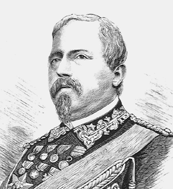Cesare Bonelli
Cesare Bonelli (born January 3, 1821 in Turin , † October 1, 1904 in Orvieto ) was an Italian general and politician who rose to become Minister of War .
Life
He was the son of the naturalist Francesco Andrea Bonelli and Fernanda d'Ancona.
Military career
Cesare Bonelli attended the military academy in Turin from 1830 to 1841 and became a lieutenant in the artillery in 1843 . By 1845 he completed an army school for artillery and engineering. In the First War of Independence he entered the service of the provisional government of Milan and received the silver medal for bravery for his service in the Battle of Goito (May 30, 1848). When the war resumed, in the spring of 1849, he was promoted to captain.
In the second war of independence of 1859 he supervised the camp of an artillery regiment standing in the field. On January 31, 1860, he was given command of the artillery depot in the province of Emilia . On November 7, 1860 he was promoted to lieutenant colonel and took part in General Cialdini's campaign in southern Italy in 1860 and 1861 . He was wounded by shrapnel during the siege of Gaeta and was awarded the Military Order of Savoy for his work during the siege of the Citadel of Messina . Promoted to colonel in 1862 , he was given command of the 1st artillery regiment in the same year and the 6th artillery regiment in 1863.
After the outbreak of the Third War of Independence against the Austrians, he led an artillery corps with the main army advancing in Lombardy under General La Marmora . In the battle of Custozza (June 24, 1866) he proved himself particularly well, his artillery moving up covered the successful retreat of General Durando's army corps . Its 23 cannons, well positioned around Valeggio , held down 46 Austrian artillery pieces and enabled General Sirtori's defeated division to retreat to the right bank of the Mincio . In 1868, Bonelli was promoted to major general and took command of the territorial artillery garrison in Milan. He later commanded garrisons in Naples and Turin and shows good organizational skills. In 1877 he was promoted to lieutenant general and was given command of the Verona military division .
Political activity
The failure of Italian politics at the Berlin Congress in 1878 led to the resignation of Foreign Minister L. Corti and the Minister of War. Prime Minister Cairoli called Bonelli to replace the outgoing General G. Bruzzo on October 24th in the new cabinet, which dissolved on December 19, 1878.
On July 14, 1879, he again took over the post of Minister of War in the third Cairoli Ministry, this time for a longer period until July 13, 1880. The expansion of the fortifications in the northern provinces, the expansion of the arms factory in Terni and his demand for an increase in military spending led quickly to his resignation. No longer able to cope with the political pressure of the opposition, he was transferred back to Verona for his divisional command. His achievements in curbing floods in September and October 1882 earned him honorary citizenship of Verona. From 1885 to November 1889 he commanded the XI. Army Corps in Bari . At the age of 83, Bonelli died on October 1, 1904 in Orvieto and was buried in Anagni .
literature
- Mariano Gabriele: Bonelli, Cesare. In: Alberto M. Ghisalberti (Ed.): Dizionario Biografico degli Italiani (DBI). Volume 11: Boccadibue-Bonetti. Istituto della Enciclopedia Italiana, Rome 1969.
Web links
- Entry in the Senatori dell'Italia liberale database of the Historical Archives of the Italian Senate
| personal data | |
|---|---|
| SURNAME | Bonelli, Cesare |
| BRIEF DESCRIPTION | Italian Minister of War |
| DATE OF BIRTH | January 3, 1821 |
| PLACE OF BIRTH | Turin |
| DATE OF DEATH | October 1, 1904 |
| Place of death | Orvieto |
